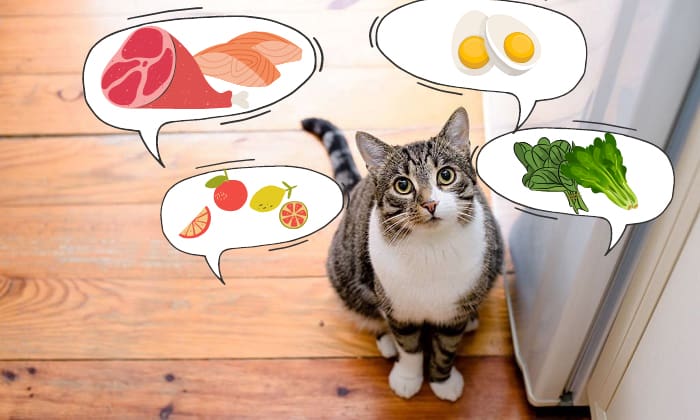Curious about what foods from your fridge are safe for your feline friend? Look no further! In this article, we will explore the human foods that cats can eat and how they can benefit from them. It’s important to note that while some human foods are safe for cats, others can be harmful or even toxic, so it’s crucial to know which ones are safe to feed your furry companion.
Meat: Cooked chicken, turkey, and lean beef are excellent choices for cats. They provide a good source of protein and essential nutrients that can support their overall health. Just make sure to remove any bones and seasoning before offering it to your cat.
Fruits and Vegetables: Some fruits and vegetables can be given to cats as treats in moderation. Bananas, blueberries, and cooked carrots are among the safe options. However, it’s important to remember that cats are obligate carnivores, so these should only be given as occasional treats.
Safe Fruits: Apples and watermelons are safe fruits for cats, but remember to remove the seeds and rinds before offering them. These fruits can provide a refreshing and hydrating snack for your feline friend.
Safe Vegetables: Steamed broccoli and green beans are healthy vegetable options for cats. They can provide additional fiber and nutrients to their diet. However, it’s crucial to avoid giving cats onions or garlic, as these can be toxic to them.
By understanding what human foods are safe for cats, you can add some variety to their diet while ensuring their well-being. Just remember to introduce new foods gradually and in moderation, and always consult with your veterinarian if you have any concerns or questions.
Meat

When offering cooked meat to your cat, it is important to ensure that it is thoroughly cooked and free from any seasonings, spices, or additives that could be harmful to them. Plain, unseasoned meat is the best option. You can either give small pieces of cooked meat as a treat or incorporate it into their regular meals to add variety and nutritional value.
Remember to always feed meat to your cat in moderation and consult with your veterinarian if you have any concerns or questions about their diet. By providing them with safe meat options, you can enhance their diet and offer them a tasty and nutritious addition to their meals.
Fruits and Vegetables

Cooked carrots are another safe option that can provide cats with additional nutrients. Carrots are rich in beta-carotene, which is beneficial for their eyesight. You can steam or boil carrots until they are soft and easily digestible for your cat.
When introducing fruits and vegetables to your cat’s diet, it’s important to monitor their reaction. Some cats may have allergies or sensitivities to certain foods, so it’s best to start with small amounts and observe any adverse reactions. Always consult with your veterinarian before making any significant changes to your cat’s diet.
- Bananas
- Blueberries
- Cooked carrots
Remember, while fruits and vegetables can provide some nutritional benefits to cats, they should not replace their regular balanced cat food. These treats should only be given in moderation and as part of a well-rounded diet.
Safe Fruits

Firstly, make sure to remove any seeds or rinds from the fruits. Apple seeds contain a compound called amygdalin, which can release cyanide when ingested in large quantities. While a few seeds may not cause harm, it’s better to be safe and remove them altogether. Similarly, watermelon rinds can be difficult for cats to digest and may cause gastrointestinal issues. So, it’s best to remove the rind before offering this juicy treat to your kitty.
By following these simple guidelines, you can safely introduce apples and watermelons into your cat’s diet as an occasional treat. Just remember to offer them in moderation and always prioritize your cat’s overall health and well-being.
Safe Vegetables

Another safe vegetable for cats is green beans. These crunchy and nutritious treats are low in calories and high in fiber, making them a healthy addition to your feline friend’s diet. However, it is essential to avoid giving cats onions or garlic as they can be toxic to them. These ingredients can cause damage to their red blood cells and lead to serious health issues.
Frequently Asked Questions
Can cats eat raw meat?
No, it is not recommended to feed cats raw meat. Raw meat can contain harmful bacteria and parasites that can make cats sick. It is best to cook the meat thoroughly before offering it to your cat.
Are all fruits and vegetables safe for cats?
No, not all fruits and vegetables are safe for cats. Some can be toxic to them. It is important to research and consult with a veterinarian before introducing any new fruits or vegetables into your cat’s diet.
Can cats eat onions and garlic?
No, cats should never be given onions or garlic. These foods can cause damage to a cat’s red blood cells and lead to anemia. It is best to avoid these ingredients completely.
Should I remove seeds and rinds from fruits before giving them to my cat?
Yes, it is important to remove seeds and rinds from fruits before offering them to your cat. These parts can be choking hazards or contain substances that are harmful to cats.
How much human food can I give to my cat?
Human food should only be given to cats as occasional treats and in small amounts. It should not replace their regular balanced cat food diet. Too much human food can lead to nutritional imbalances and obesity in cats.
